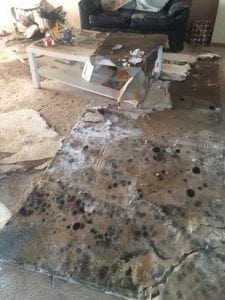Avoiding the disaster of water damage..
The Do’s, Don’ts, and maybe’s of leaving home for vacation or simply an extended period away from your castle.
As an IICRC Master Certified water damage restorer, it’s safe to say that in my more than twenty years of unwavering twenty-four, seven day a week service (OK, there were a few times I waivered) that I’ve seen more than most when it comes to the results of unattended water damage to your contents, structure, and daily lives. Trust me, even a small water damage will upend everyone for a period of time. The equipment is loud, annoying as hell, and the temperature in the room gets pretty unbearable during the cleanup.
I just returned from an inspection of a residence for a homeowner and my first thought was to sit down and write this post. If anything, in the end maybe it will save some joyous reader the same amount of trouble that I’ve seen countless of times over and over.
In this particular instance, the homeowner travels often for work, living in a residence here and one in New York City. After a rather long stay in New York, she returned home late this past Friday night to discover most of the drywall ceilings on the first floor of the residence here in Columbus had collapsed onto the floor and mold covered not only the remnants of drywall but many of her possessions as well. Water was everywhere, in fact, was still pouring from the ceilings. She was sure that she had turned off the water main prior to leaving. At least she thought she was sure of it.
In a frantic, she reached out to a friend who referred her to me. I was onsite in twenty minutes. The entire time I was there documenting the claim, taking photographs, entering journal notes, game planning with the office for staffing it kept running thru my mind how easily it’s avoidable. How bad I felt that I didn’t reach out prior (even though we had never met) just to give her some advice.
Easy in my mind. I’ve seen it countless times over. From the smallest of water leaks to entire apartment buildings. In Columbus, Ohio all the way down to Florida. I’ve never done anything but water damage work. I do love it but I feel bad seeing it. Seeing what can be avoided in most cases. Some cases simply can’t be, in those cases, it’s bum luck. A burst supply line is hidden deep inside the bathroom walls while away at work, a sump pump fails and gives up trying in the middle of the night or in my own personal case, a young daughter decides to turn our bathroom into an indoor swimming pool by overflowing the bathtub. Some of these are just not avoidable but then again, that’s why I’m in the business.
Ok, I brought you all here for a reason.
Some disasters in your home are avoidable
I’d like to think many of these tips come to us in hindsight, sort of did I leave the iron on types of thought we’ve all had while driving away or my personal favorite, the wife calling me to ask if I remember whether she turned off the curling iron? I wouldn’t have clue as to which one of the ten things hanging there is a curling iron and certainly would not remember if she did. I figure I’m just like many of you. I’m getting old, my basement floods as well. I have a dehumidifier there constantly, it’ll dry I figure.
- If you’re leaving home, turn off the water main. In the case above she thought she did but neglected to check by turning on the water valves and letting the supply lines drain. Leave the valves open, it’s not going to hurt a thing.
Quick tip: “In the winter months, you will help to prevent frozen supply lines by leaving the valves open and the lines drained” - Open water outside water valves and disconnect the water hoses. Water left in these supply lines can freeze; often resulting in small cracks that will not be noticed until you turn the water back on. This often results in burst supply lines flooding a basement.
- (Skip if your home or business doesn’t have a sump pump)
Verify the sump pump is working. Most work on a float ball system that can be verified by simply lifting the float to allow the pump to engage. If your sump pump is covered by a radon system cap, open the access and fill the pit using a water hose to test it. I would highly recommend replacing any pump more than five years old. I know they always “promise” to last longer but a small investment today could be the saving factor in avoiding a disaster in your home. - Have a water bed? Get rid of it. I don’t know of anyone that still has those today.
- VERIFY that your thermostat is set above freezing and is on. No insurance policy will cover losses to a home or business where you failed to provide adequate heating.
I’m sure after I post this that I will think of more. It’s the hindsight thing again. If you find yourself planning a vacation or an extended period away from home, mark your calendar for a day or two ahead of time and google tips for protecting yourself from water damage. If you’re in a pinch and around Columbus, Ohio feel free to give me a ring. I’m sure I’ll still be on call.

